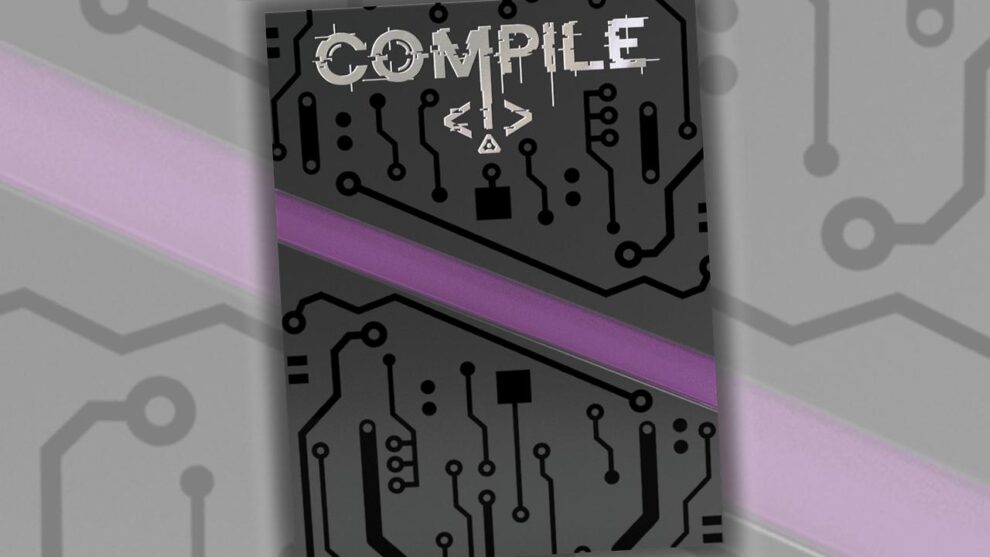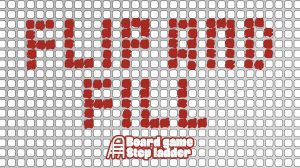Disclosure: Meeple Mountain received a free copy of this product in exchange for an honest, unbiased review. This review is not intended to be an endorsement.
From the rulebook: “Compile is a competitive card game where players are rogue AI competing one-on one in a race to compile their 3 protocols, rewriting reality in their new image.”
Compile is a game about playing cards into different columns in an attempt to achieve a greater value in that column than your opponent, allowing you to compile one of your Protocols. The first person to compile all three of their Protocols wins.
Admittedly, the theme is weird and the backstory is a tad on the nonsensical side, but overall, the theme suits the mechanics well enough. Read on for a more thorough breakdown of the gameplay, or feel free to skip ahead to the Thoughts section to find out what I think about the game.
How It’s Played
Compile is composed of 12 unique decks of cards consisting of 6 cards each. At the beginning of a game, the two players will take turns drafting three decks each which will be shuffled together to create an 18-card deck. Each deck is representative of a specific ‘Protocol’.
Each player will begin the game with their three Protocols laid out in a row before them with their Protocols butting up against their opponent’s Protocols, creating a 3×2 array with each player’s cards facing them.
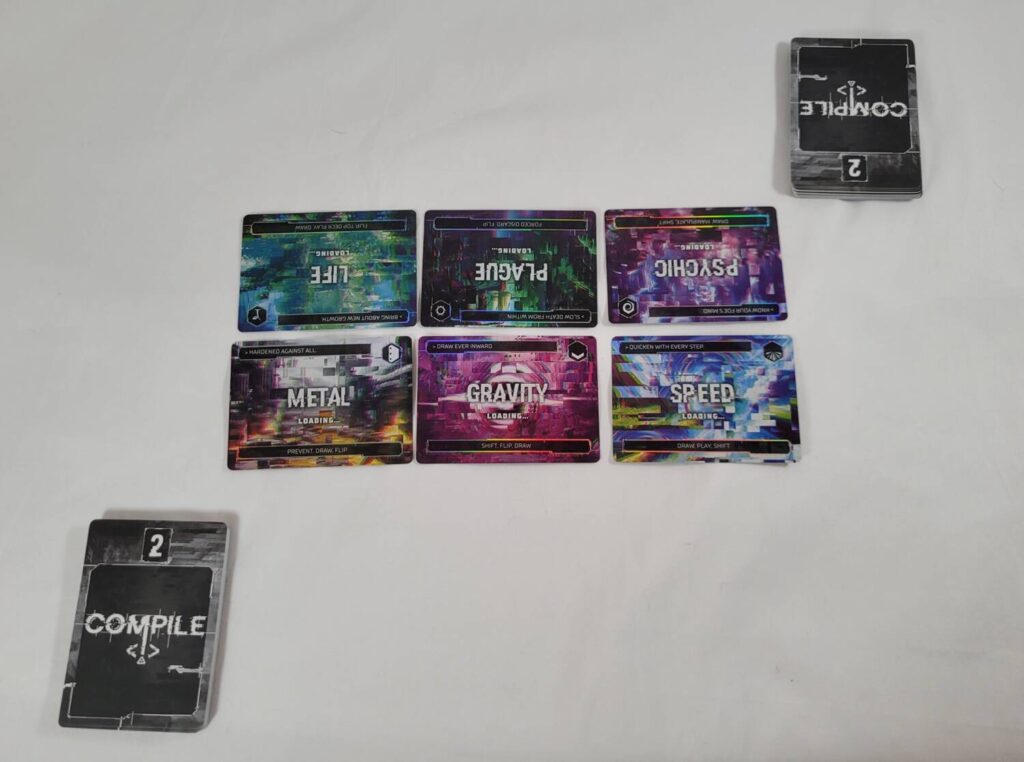
On a player’s turn, they will have the opportunity to either add cards to one of the columns beneath their Protocols (‘lines’ in the game’s vernacular) or refill their hands with new cards. Cards can be played face up into their respective lines (i.e. the Protocol that matches the card) or face down into any line. When a new card is added to a line, it overlaps the last card placed into that line.
Cards are played into lines in order to take advantage of their unique abilities and their numeric values. These abilities will allow you to rearrange your own (or your opponent’s) Protocols, discard cards to draw new ones, flip cards to their opposite sides, remove cards from play, etc. Some abilities are instantaneous and their effects fire off as soon as the card hits the play area while others’ effects are only viable so long as the ability text remains uncovered. Face down cards do not lend their abilities, but are worth a fixed value of 2 apiece.
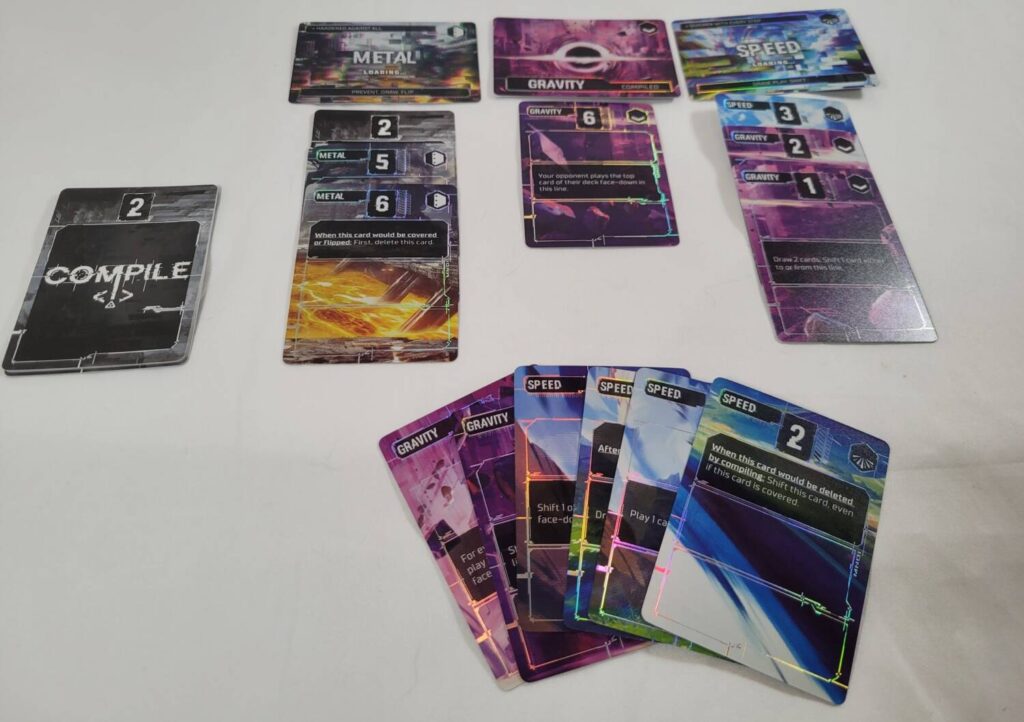
At the beginning of your turn, if you’ve managed to add a total overall value of at least 10 to a line, and if your overall value is higher than your opponent’s overall value in the same line, then you ‘compile’ your Protocol (flip it face down). When this happens, all cards in that line (yours and your opponent’s) are removed from play and added to their owner’s discard pile. Then, your turn comes to an end.
If you are able to compile, then you MUST compile. If compiling a line that’s already been compiled previously (‘recompile’ in gamespeak), the entire line is cleared as normal, and you draw a card from the top of your opponent’s deck instead of flipping your Protocol card.
The winner is the first person to compile all 3 of their Protocols.
The Advanced Mode
It is worth noting that there is an advanced mode that includes a ‘Control Component’. This component passes hands from player to player based on who has the highest overall value in at least 2 lines at the start of their turn. Possessing the Control Component gives you the ability to rearrange yours, or your opponent’s, Protocols when compiling or refreshing your hand.
While that may not seem like much, it matters because rearranging Protocols only moves the Protocol cards themselves, not the associated lines. This means that you could conceivably shift one of your opponent’s already compiled Protocols to a line that they were hoping to use to compile an entirely different Protocol. This would cause them to have to recompile that entire line, setting them back while also buying you more time in the process. Alternatively, you could use this ability to rearrange your own Protocols, allowing you to compile a Protocol that may have previously seemed out of reach.
Thoughts
I’d like to start off by saying that Compile is a good looking game. Purple and black and silvery, the spot-UV bedazzled packaging makes a statement. I already knew what I was getting into before I’d even cracked open the clamshell case: futuristic, cyberpunky goodness. And, the game didn’t disappoint. When I opened the box of cards, I realized that these aren’t just cards. They’re CARDS. Thick cardstock. Linen finish. Metallic. These cards are opulent.
Before digging into the gameplay, I was already expecting great things.
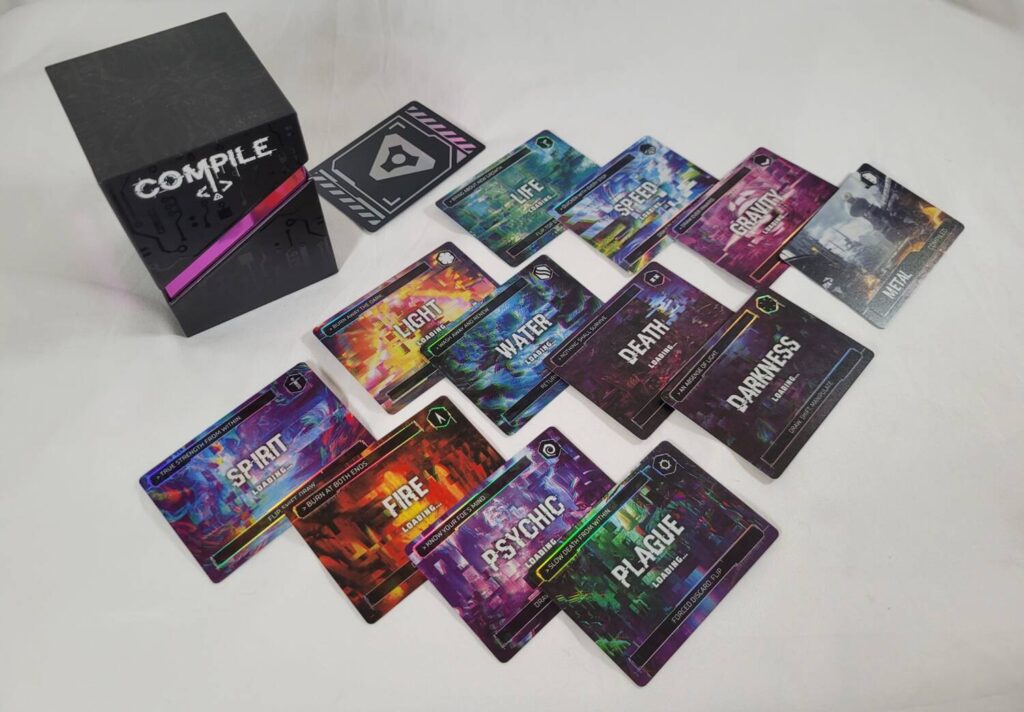
Mechanically, Compile is a very easy game to pick up and start playing. The real challenge with Compile is less about the actual gameplay and more about the initial deck selection. There are a total of 12 different decks, and each player will be choosing 3 of these at the beginning of the game. Using the non-repeating combination formula n!/(n−k)!⋅k!, where n=12 (the total number of decks) and k=3 (the number of decks in a single, non-repeating combination), you’ll come up with 220 possible combinations of 3 different decks. Out of those 220 combinations, only a small percentage of them actually complement each other. Most of them, in my admittedly limited experience with the game thus far, do not.
If you’ve drafted three decks that seem to be the antithesis of one another (which is likely to be the case in your first few games), what follows is an exercise in futility and frustration as you struggle to put something together. The advanced mode helps with this somewhat, but only if you’re fortunate enough to have enough overall value to actually gain access to the Control Component.
A while ago, I reviewed another game that is very similar to Compile in nature: Air, Land, and Sea. As mentioned previously, the specific cards in Compile can only be played into their matching lines unless they’re played into a different non-matching line face down. The cards in Air, Land, and Sea function in the same way. Each card belongs to a specific theater of war, but can be played into a non-matching theater so long as it’s played face down. In Air, Land, and Sea this works because there are only a total of 18 cards in the entire game. To call the gameplay fine-tuned would be an understatement. Because of its svelte size, Air, Land, and Sea chugs along like a well-oiled machine with each player enjoying the same advantages (and disadvantages) as their opponent. It’s a game of wits more so than a game of luck.
Because of its size, scope, and variability, the same cannot be said about Compile. While there is a fair amount of skill in the initial draft—putting together a good trio of decks—it’s going to take you a whole lot of games to get to the point where you’re able to figure out which decks work well together and which ones don’t. If Compile is the only game sitting on your game shelf, that’s not a problem. However, chances are that you’re like me and have a large selection of games clamoring for your time. If your first few games leave you feeling frustrated, what are the chances you’ll ever revisit Compile when you have access to other titles that don’t leave you feeling that way? I’d wager the likelihood is very little. And, if you do put in the time to figure it out, then that whole aspect of variability disappears as you and your opponent wind up playing the same combination of decks over and over again. The other six decks may as well not even exist.
However, if you’re fortunate enough to draft a combination of decks that are complementary, what follows is a thoroughly enjoyable and challenging experience.
In these instances, Compile will find you constantly having to make the tough decisions between setting yourself up for exciting combo chains, trying to stave off your opponent’s attempts at compiling, and trying to ensure you’ve got enough cards in your hand in order to have more options available to you on your turns. It isn’t enough to just reach a value of at least 10 in a single line. You’ve got to have a higher overall value than your opponent, and that majority must last until the beginning of the next round: no small feat. Do you try to set yourself up to combo into multiple potential compile actions to better your chances of successfully compiling at least one of them? Or do you laser focus on one single line and try to create an overall value so high that your opponent is going to have a hard time topping it? Maybe instead of racing to the end, you take it slow and steady, building up your own lines while focusing on preventing your opponent from building up theirs.
When your chosen decks mingle harmoniously, the variability works in Compile’s favor, generating tense, exciting moments that are worth coming back for.
You just have to be willing to invest the time to make the journey.


